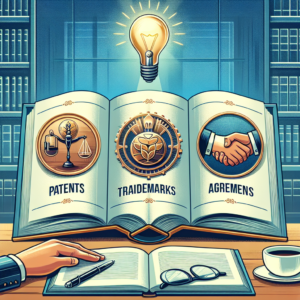Trademark Turmoil: Unraveling the Most Shocking Controversies of Our Time
[caption id="attachment_35121" align="alignnone" width="626"] Intellectual Property[/caption]
In an increasingly interconnected world, trademark law has become a battleground for businesses, consumers, and cultural identities. As companies strive to protect their intellectual property, the complexities of trademark disputes have led to some of the most shocking controversies of our time. This article delves into the intricacies of trademark law, highlights high-profile disputes, examines the role of social media, and discusses the delicate balance between cultural appropriation and trademark rights. Furthermore, we will explore the impact of these controversies on brand reputation and consumer trust, as well as the future trends shaping trademark law in a globalized economy.
Understanding Trademark Law: A Foundation for Navigating Controversies
Trademark law serves as a critical framework for protecting brands and their identities in the marketplace. At its core, a trademark is a symbol, word, or phrase legally registered or established by use as representing a company or product. The primary purpose of trademark law is to prevent consumer confusion and ensure that businesses can distinguish their goods and services from those of competitors. However, the nuances of trademark law can lead to significant controversies, particularly when it comes to issues of infringement, dilution, and fair use. Understanding these legal principles is essential for navigating the complex landscape of trademark disputes, as they often involve not only legal considerations but also ethical and cultural dimensions.
High-Profile Trademark Disputes: Case Studies That Shook the Business World
Several high-profile trademark disputes have captured public attention and sparked widespread debate. One notable case is the legal battle between Apple and Samsung over smartphone design patents, which raised questions about innovation and competition in the tech industry. Another significant controversy involved the clothing brand Supreme, which faced backlash for its trademarking of the word "Supreme," leading to discussions about the implications of trademarking common terms. Additionally, the dispute between the Washington Redskins and Native American groups over the team's name and logo highlighted the intersection of trademark rights and cultural sensitivity. These cases not only illustrate the complexities of trademark law but also underscore the broader societal implications of how brands are perceived and represented.
The Role of Social Media in Amplifying Trademark Controversies
In the digital age, social media has emerged as a powerful tool for amplifying trademark controversies. Platforms like Twitter, Instagram, and TikTok allow consumers to voice their opinions and mobilize support for or against brands in real-time. This instantaneous communication can escalate disputes, as seen in the backlash against brands accused of cultural appropriation or unethical practices. For instance, when a popular fashion brand was criticized for using indigenous patterns without permission, social media users quickly rallied to condemn the brand, leading to significant reputational damage. The viral nature of social media means that trademark controversies can gain traction rapidly, forcing companies to respond swiftly to public sentiment or risk long-term damage to their brand image.
Cultural Appropriation vs. Trademark Rights: A Delicate Balance
The intersection of cultural appropriation and trademark rights presents a complex challenge for businesses and legal systems alike. Cultural appropriation refers to the adoption of elements from one culture by members of another, often without permission or understanding of the original context. When brands seek to trademark culturally significant symbols or terms, they may inadvertently perpetuate harmful stereotypes or exploit marginalized communities. This delicate balance raises critical questions about who has the right to use certain cultural elements and under what circumstances. As society becomes more aware of these issues, brands must navigate the fine line between protecting their trademarks and respecting cultural heritage, leading to ongoing debates about ethical branding practices.
The Impact of Trademark Turmoil on Brand Reputation and Consumer Trust
Trademark controversies can have profound implications for brand reputation and consumer trust. When a brand becomes embroiled in a legal dispute or faces public backlash, the resulting negative publicity can erode consumer confidence and loyalty. For example, brands that are perceived as engaging in cultural appropriation may find themselves boycotted by consumers who prioritize ethical consumption. Conversely, companies that proactively address trademark issues and demonstrate a commitment to social responsibility can enhance their reputation and strengthen consumer trust. In an era where consumers are increasingly informed and engaged, brands must be vigilant in managing their trademark portfolios and addressing controversies to maintain their standing in the marketplace.
Future Trends: How Trademark Law is Evolving in a Globalized Economy
As the global economy continues to evolve, so too does trademark law. One significant trend is the increasing harmonization of trademark regulations across jurisdictions, driven by international treaties and agreements. This globalization of trademark law presents both opportunities and challenges for businesses operating in multiple markets. Additionally, the rise of e-commerce and digital branding has prompted discussions about the need for updated legal frameworks to address issues such as online infringement and the protection of digital trademarks. Furthermore, as consumers become more socially conscious, brands may face greater scrutiny regarding their trademark practices, leading to a shift towards more ethical and inclusive branding strategies. The future of trademark law will likely be shaped by these trends, as businesses adapt to the complexities of a rapidly changing global landscape.
In conclusion, trademark turmoil has emerged as a significant issue in today's business environment, with far-reaching implications for brands, consumers, and cultural identities. As we have explored, the complexities of trademark law, high-profile disputes, the influence of social media, and the delicate balance between cultural appropriation and trademark rights all contribute to the ongoing challenges faced by businesses. The impact of these controversies on brand reputation and consumer trust cannot be overstated, and as trademark law continues to evolve in a globalized economy, companies must remain vigilant in navigating this intricate landscape. Ultimately, the future of trademark law will depend on the ability of businesses to balance their rights with ethical considerations, fostering a marketplace that respects both innovation and cultural heritage.
